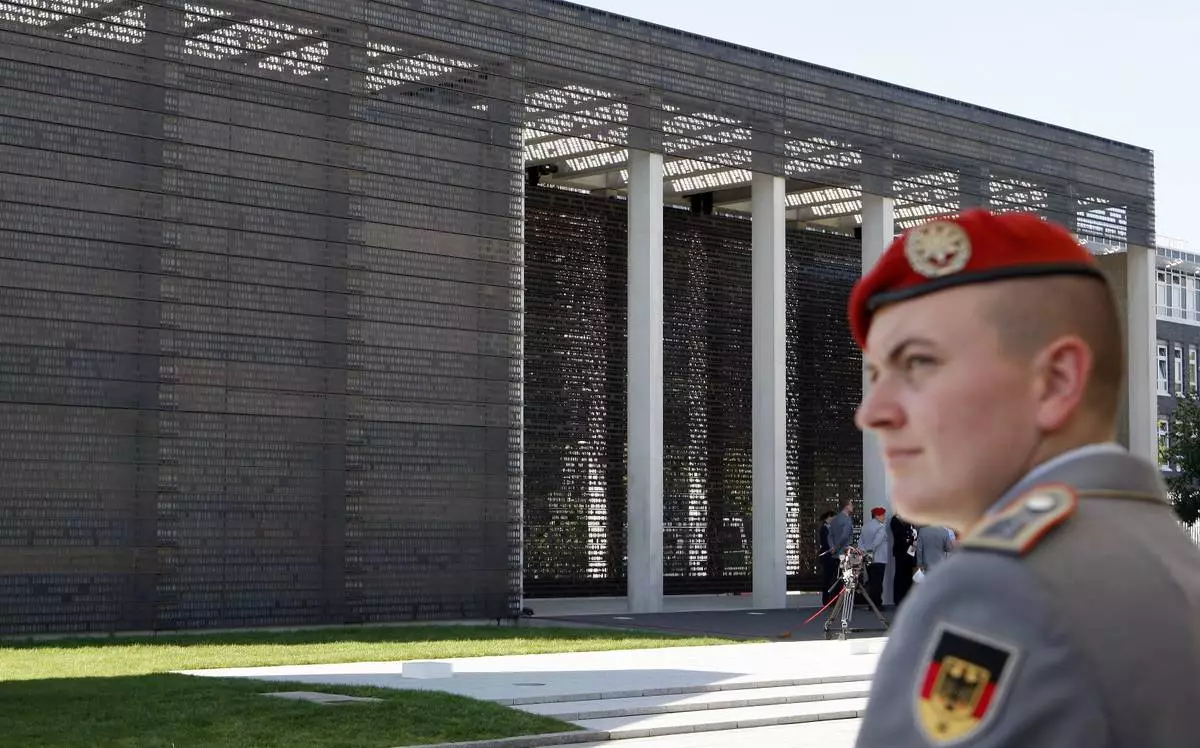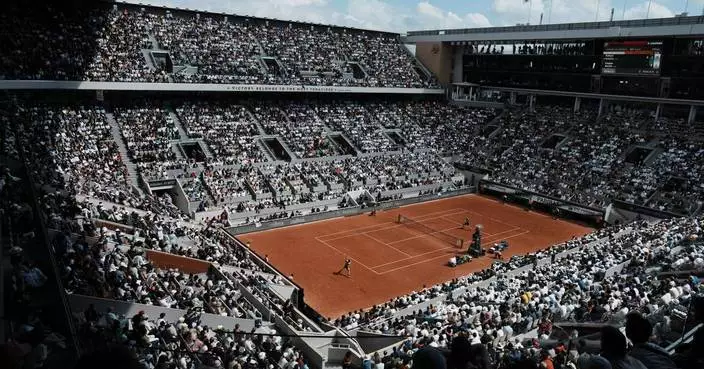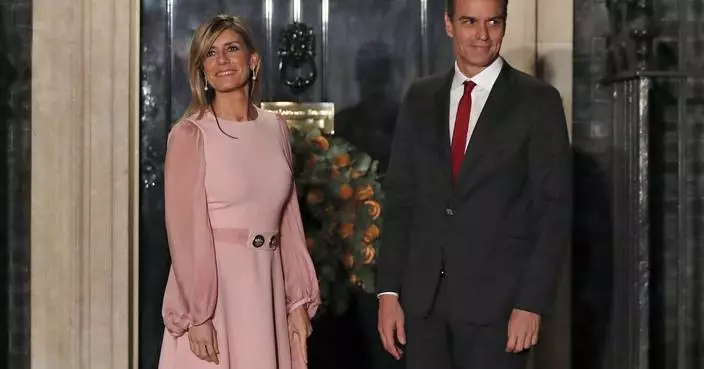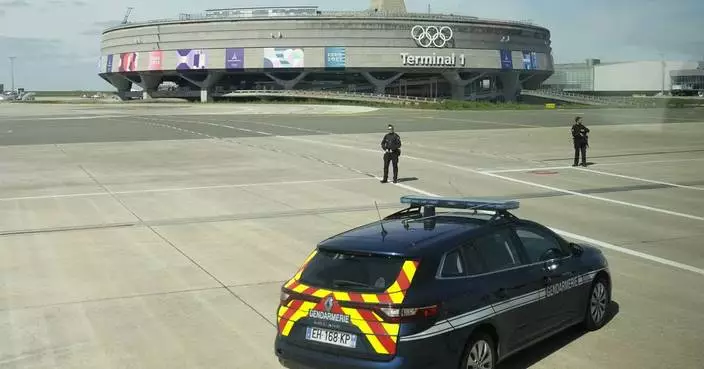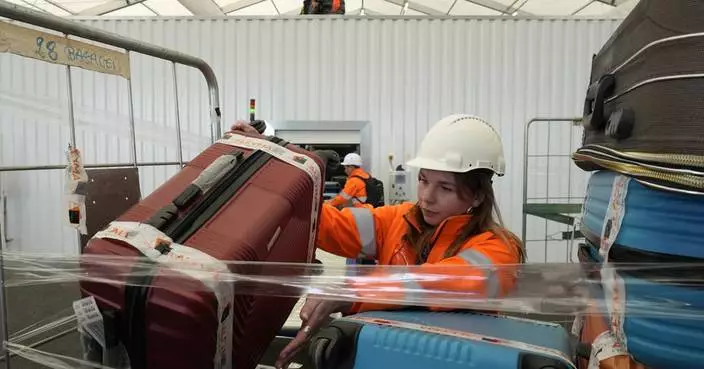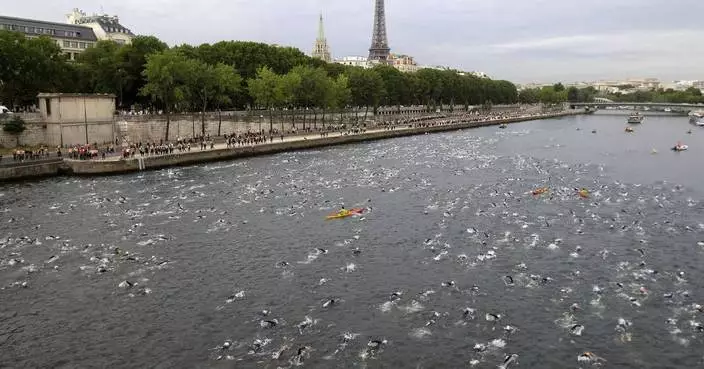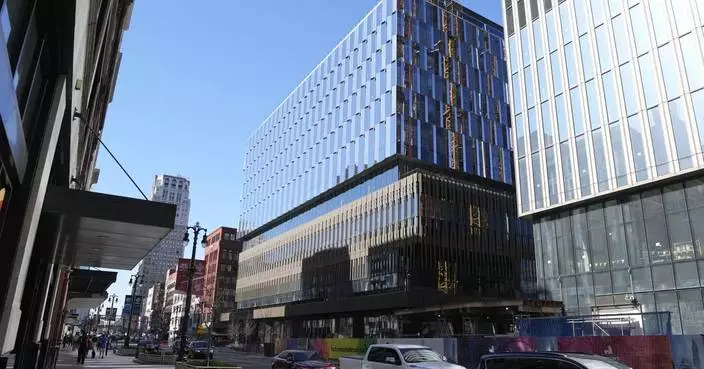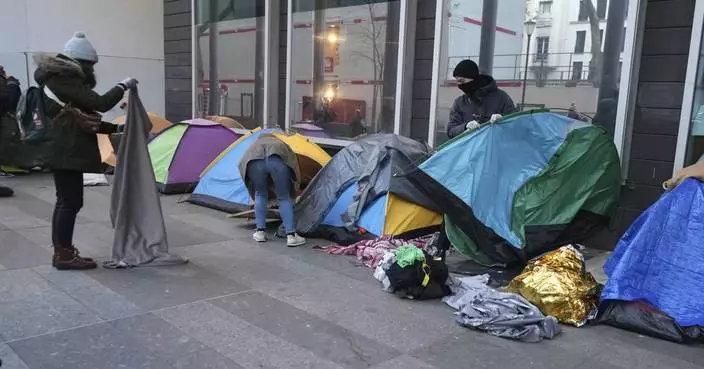Russian athletes will be allowed to stand on the medal podium at the Winter Olympics — just not with their anthem playing or their nation's flag rising above them.
The International Olympic Committee barred Russia and its sports leaders from the upcoming games in South Korea after its lead investigator concluded members of the Russian government concocted a doping scheme at the 2014 Sochi Games that "caused unprecedented damage to Olympism and to sports."
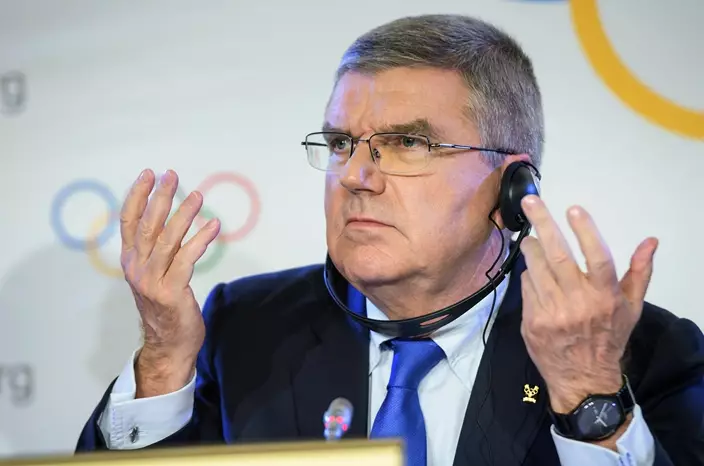
International Olympic Committee, IOC, President Thomas Bach from Germany, reacts during a media conference after an Executive Board meeting, in Lausanne, Switzerland, Tuesday, Dec. 5, 2017. (Jean-Christophe Bott/Keystone via AP)
Not welcome in Pyeongchang next year will be any sign of the Russian Olympic Committee or any member of its sports ministry, which was responsible for what investigators concluded was a top-to-bottom scheme of "manipulation and cheating" to ensure Russians could dope at the Olympics on their home turf and not get caught.
The IOC punishment did leave room for many Russians to compete under the name "Olympic Athlete from Russia" or OAR. They would have to pass drug tests to prove they were clean and also did not benefit from the Sochi scheme.
If they win, the Olympic flag would be raised and the Olympic anthem played to honor their victories. That is, if Russian President Vladimir Putin allows them to go to the Feb. 9-25 games. He previously has said it would be humiliating for Russia to compete without its national symbols.
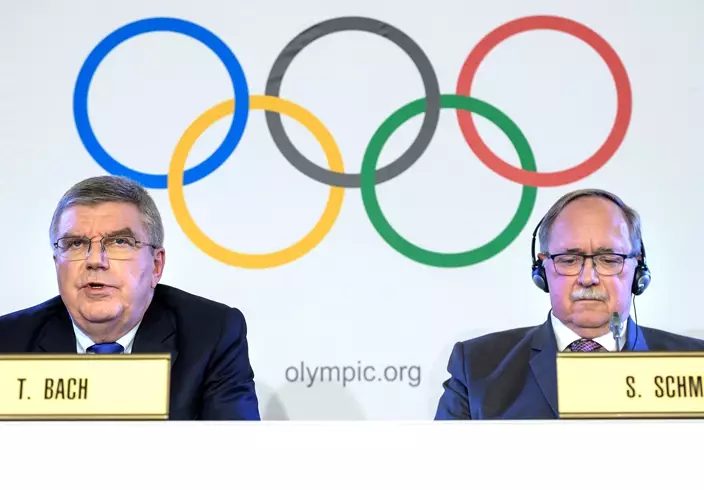
International Olympic Committee, IOC, President Thomas Bach from Germany, left, and Samuel Schmid, President of the IOC Inquiry Commission and former President of Switzerland, right, comment during a press conference after an Executive Board meeting, in Lausanne, Switzerland, Tuesday, Dec. 5, 2017. (Jean-Christophe Bott/Keystone via AP)
"An Olympic boycott has never achieved anything," IOC President Thomas Bach said at a news conference. "Secondly, I don't see any reason for a boycott by the Russian athletes because we allow the clean athletes there to participate."
Alexander Zhukov, the Russian Olympic Committee president who also was suspended from his IOC membership, told TV reporters in Lausanne that one key was preserving the name "Russia" in the team name.
"They'll be called Russian athletes and not some kind of neutrals ... that's very important," Zhukov said.
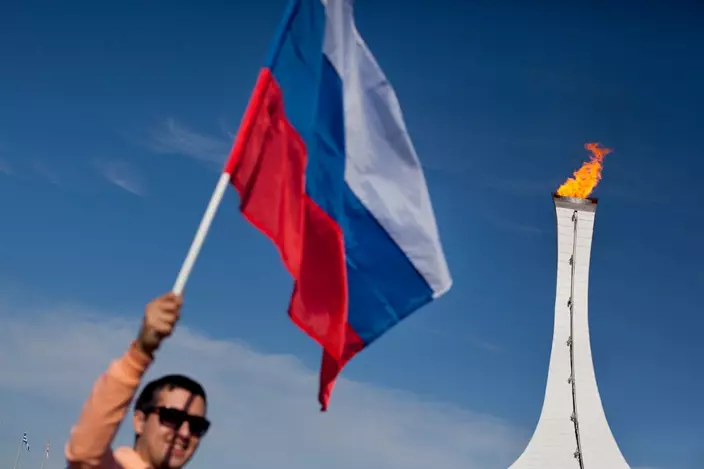
FILE - In this Feb. 15, 2014 file photo a man carries the Russian national flag past the burning Olympic cauldron at the 2014 Winter Olympics in Sochi, Russia. (AP Photo/Peter Delong, file)
If it was a victory to have the word "Russia" in the team name and invite some Russian athletes to compete, it came at a cost.
The IOC also suspended the Russian Olympic Committee until at least the start of the closing ceremony in South Korea.
In an embarrassment for Russia's hosting of the 2018 World Cup, the IOC also banned Russian Deputy Prime Minister Vitaly Mutko from the Olympics for life.
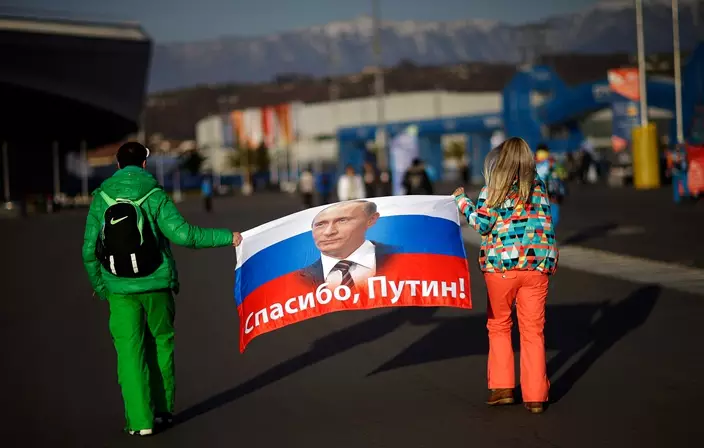
FILE - In this Feb. 23, 2014 file photo Veleriya Obarevich, right, and Yan Shamilov carry a Russian flag with the message "Thank you, Putin!" written across it in Russian through Olympic Park ahead of the 2014 Winter Olympics closing ceremony in Sochi, Russia. (AP Photo/David Goldman, file)
Mutko heads the organizing committee of soccer's next World Cup. As sports minister in 2014, he was deeply implicated in the Sochi doping plot by two IOC commissions and a World Anti-Doping Agency investigation.
"The IOC executive board has made its positon to the responsibility of Mr. Mutko very clear," said Bach, who would not comment if it was appropriate for soccer's governing body FIFA to continue working with an official who is also president of Russia's soccer federation.
At the State Kremlin Palace on Dec. 1, FIFA President Gianni Infantino said at a joint news conference with Mutko that the IOC's decision would not affect the World Cup.
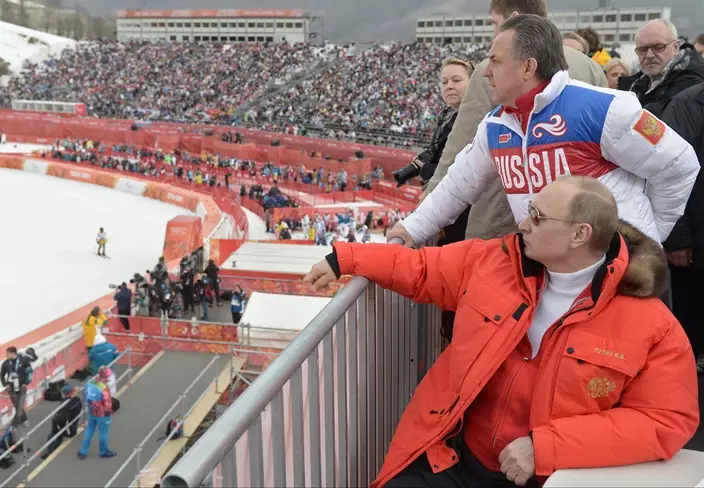
FILE - In this file photo taken Saturday, March 8, 2014, Russian President Vladimir Putin, foreground, watches downhill ski competition of the 2014 Winter Paralympics in Roza Khutor mountain district of Sochi, Russia, as Russia's sports minister Vitaly Mutko stands behind. On Tuesday, Dec. 5, 2017 IOC imposed a lifetime Olympic ban on Mutko. (AP Photo/RIA-Novosti, Alexei Nikolsky, Presidential Press Service, file)
That message was repeated Tuesday by FIFA in a statement which noted that its ethics and disciplinary committees could still open cases against Mutko and Russian soccer players implicated in doping cover-ups.
The IOC also imposed a fine of $15 million on the Russian Olympic Committee to pay for its two investigations into the case and toward future anti-doping work.
The sanctions could be challenged at the Court of Arbitration for Sport.
Any Russian athlete hoping to earn invitations to Pyeongchang will have to come through a stricter-than-usual testing regime and not have a doping violation on their record.
Invitations will be decided by an IOC panel chaired by former France Sports Minister Valerie Fourneyron.
The IOC also will bar Russian officials who were team leaders at Sochi, and coaches or medial staff who have been linked to doping athletes.
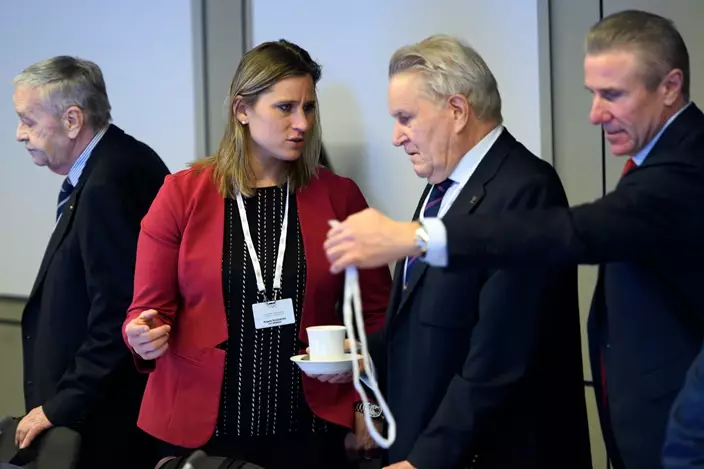
International Olympic Committee (IOC) members Denis Oswald, center right, of Switzerland, speaks with Angela Ruggiero, center left, from the United States, next to Gian-Franco Kasper, left, from Switzerland and Sergey Bubka, right, from the Ukraine, prior to the opening of the first day of the executive board meeting of the International Olympic Committee (IOC) at the IOC headquarters, in Pully near Lausanne, on Tuesday, Dec. 5, 2017. (Laurent Gillieron/pool photo via AP)
The CEO of the Sochi Olympics, Dmitry Chernyshenko, also had his place on an Olympic panel overseeing the 2022 Beijing Winter Games withdrawn by the IOC.
Russia has repeatedly refused to accept that a state-sponsored doping program existed. Such denials helped ensure bans on its track federation and anti-doping agency have not been lifted.
Instead, Russia blames Grigory Rodchenkov, the former director of Moscow and Sochi testing laboratories, as a rogue employee. It wants the scientist extradited from the United States, where he is a protected witness.
The executive board reached its decision Tuesday after a scheduled 4½-hour debate when it heard from a Russian delegation that included world figure skating champion Evgenia Medvedeva. The delegation was led by Zhukov, who was later suspended.
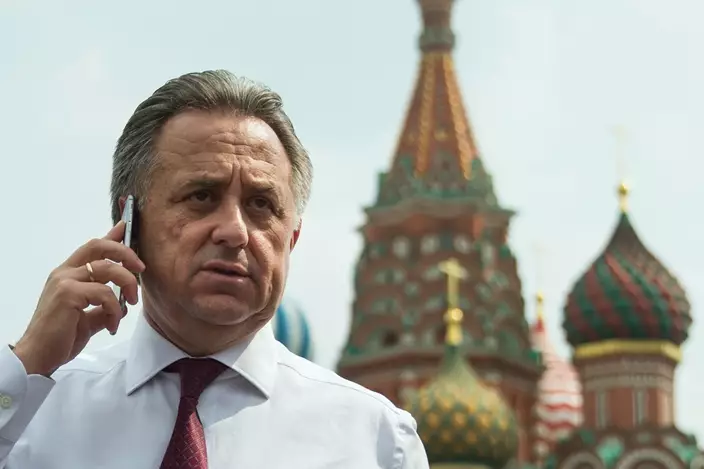
FILE - In this July 27, 2016 file photo Russia's Sports Minister Vitaly Mutko uses a mobile phone with the St.Bazil's Cathedral at the background, as he walks for a meeting with Russian President Vladimir Putin, in Moscow, Russia. On Tuesday, Dec. 5, 2017 IOC imposed a lifetime Olympic ban on Mutko. (AP Photo/Pavel Golovkin, file
Two IOC commission leaders — appointed after WADA investigator Richard McLaren upheld Rodchenkov's doping claims in July 2016 — also reported to the Olympic board.
The report by IOC-appointed investigator Samuel Schmid, the former president of Switzerland who was asked to verify an "institutional conspiracy," included a 50-page sworn affidavit from Rodchenkov, who was also a key witness for McLaren and an IOC disciplinary commission.
The chairman of that disciplinary panel, Swiss lawyer Denis Oswald, reported about prosecuting Russian athletes implicated in cheating at Sochi. By Monday, 25 Russians had been disqualified from the Sochi Games and banned from the Olympics for life, and 11 medals were stripped. One Russian was cleared.
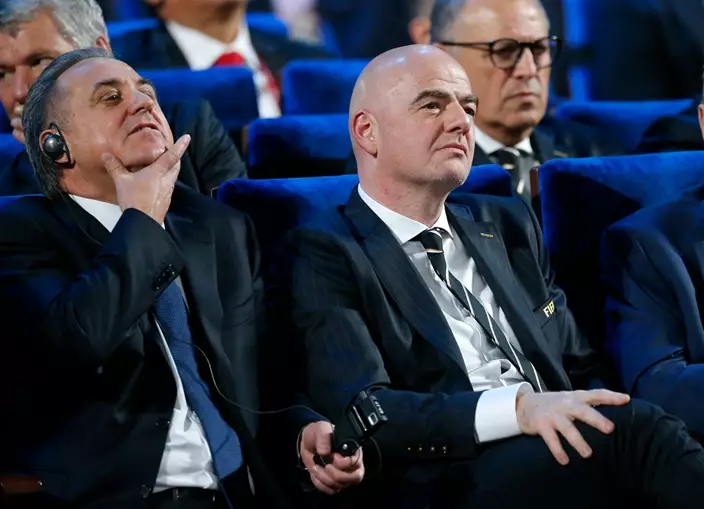
FILE - In this Dec. 1, 2017 file photo FIFA president Gianni Infantino, right, and Vitaly Mutko, Russian Federation Deputy Prime Minister & Local Organising Committee Chairman attend the 2018 soccer World Cup draw in the Kremlin in Moscow. On Tuesday, Dec. 5, 2017 IOC imposed a lifetime Olympic ban on Mutko. (AP Photo/Alexander Zemlianichenko, file)
Russia no longer leads the Sochi medals table. Even before the IOC reallocates the stripped medals, the United States has the most total medals and Norway has the most golds.
The banned Russian athletes have said they will appeal the Oswald judgments at the Court of Arbitration for Sport.
Any sanctions imposed by the IOC can also be challenged at CAS, and later at Switzerland's supreme court, which can intervene if the legal process has been abused.



